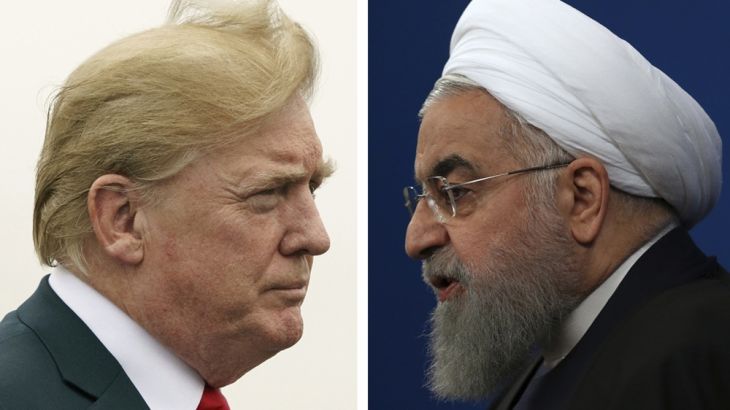Trump-Rouhani UNGA meeting not on our agenda: Iran
Tehran calls reports suggesting 2 presidents might meet on sidelines of upcoming UN General Assembly ‘speculation’.

A meeting between the presidents of Iran and the United States on the sidelines of an upcoming United Nations General Assembly (UNGA) is not on Tehran’s agenda, the Iranian Ministry of Foreign Affairs has said.
“We have neither planned for this meeting, nor do I think such a thing would happen in New York,” spokesman Abbas Mousavi said in remarks aired on state television on Monday.
Mousavi described reports suggesting that Iranian President Hassan Rouhani and his US counterpart, Donald Trump, would meet at the UN’s headquarters later this month as mere “speculation”.
US Secretary of State Mike Pompeo said last week that Trump may meet Rouhani at the UNGA with “no preconditions”.
However, Trump rebuffed Pompeo’s statement on Monday, tweeting: “The Fake News is saying that I am willing to meet with Iran, ‘No Conditions.’ That is an incorrect statement (as usual!).”
Drone attacks spark tensions
Tehran’s statement on Monday came amid rising tensions after Washington accused it of being behind Saturday’s drone attacks on two major oil facilities in Saudi Arabia.
Yemen’s Houthi rebels claimed responsibility for the assault on Abqaiq – the world’s largest oil processing plant – and the Khurais oilfield. The pre-dawn attacks at the Saudi Aramco plants knocked out more than half of crude output from the world’s top exporter.
However, Pompeo blamed Iran, accusing it of launching “an unprecedented attack on the world’s energy supply.”
Meanwhile, Trump wrote on Twitter on Sunday that “there is reason to believe” that the White House knows the culprit of the attack, and that the military is “locked and loaded” to take action.
Iran‘s Ministry of Foreign Affairs on Sunday called the US allegations “meaningless” and said they were meant to justify actions against Iran.
In his statement on Monday, foreign ministry spokesman Mousavi added: “As we have stated before, if the Americans return to the JCPOA and cease their economic terrorism, they can return to the joint commission and talk.”
He was referring to the Joint Comprehensive Plan of Action, a multinational 2015 agreement that gave Iran the promise of relief from sanctions in return for curbs on its nuclear programme.
Friction between the US and Iran have escalated since May last year, when Washington unilaterally pulled out of the deal and slapped Tehran with sanctions once again.
‘Diplomatic tactic’
Al Jazeera’s Dorsa Jabbari, reporting from Tehran, said many in Iran think that the US is trying to force Iran to the negotiating table through diplomatic tactics.
“By accusing Iran without any evidence of being behind such an attack [on Saudi Aramco], analysts say the US government is trying to force Iran’s hands to the negotiating table,” Jabbari said.
“But the Iranians have said over and over again that … under the current conditions – the US withdrawal from the nuclear deal and the imposition of a series of sanctions – they will not have that dialogue.”
Saudi Arabia oil supply was attacked. There is reason to believe that we know the culprit, are locked and loaded depending on verification, but are waiting to hear from the Kingdom as to who they believe was the cause of this attack, and under what terms we would proceed!
— Donald J. Trump (@realDonaldTrump) September 15, 2019
In an interview with Al Jazeera, Lawrence Korb, former US assistant defence secretary, said the last thing Trump wanted is a conflict with Iran.
“If we would attack Iran, then we would have a very, very violent conflict that would spread throughout the whole Gulf,” he said.
“That would only escalate the problems that we have. Really, what we need to do is end the civil war in Yemen.”
China on Monday urged the US and Iran to “exercise restraint”, with foreign ministry spokeswoman Hua Chunying saying it was not her responsibility to accuse others “in the absence of a conclusive investigation or verdict”.
Russian presidential spokesman Dmitry Peskov told reporters on Monday that international community should not draw “hasty conclusions” on who staged the attacks on Saudi oil facilities.
‘Maximum pressure’
The US has gradually increased the strength and number of the sanctions on Iran since its withdrawal from the nuclear deal as part of a campaign of “maximum pressure”.
“Having failed at ‘max pressure’, US Secretary of State Mike Pompeo turning to ‘max deceit’,” Iranian Foreign Minister Mohammad Javad Zarif wrote on Twitter on Sunday, in response to Washington’s accusations over the Saudi oil attacks.
“US and its clients are stuck in Yemen because of illusion that weapon superiority will lead to military victory,” he added, calling for talks to end the war in the Arab world’s most impoverished country.
With support from the US, Saudi Arabia has been leading since March 2015 a military coalition fighting the Houthi rebels in support of Yemen’s internationally recognised government.
The war has killed tens of thousands of people, thrust millions to the brink of famine and spawned the world’s most devastating humanitarian crisis.
Human rights groups have criticised the Saudi-led coalition for targeting civilians at hospitals, schools and markets, while also condemning Western countries for providing it with arms.
In April, US President Trump vetoed a bipartisan resolution that would have forced the US military to end its support of the coalition forces.
Saudi Arabia has long accused Iran of supplying the Houthis with missiles and drones, a charge both Iran and the group reject. Iran says it supports the rebels diplomatically and politically but denies providing them with any military aid.